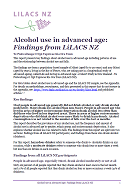This is a short report about alcohol use among people in advanced age using findings from the Life and Living in Advanced Age Cohort Study (LiLACS NZ).

Alcohol use in advanced age: Findings from LiLACS NZ presents key findings about the frequency and amount of alcohol use and the relationship between falls and alcohol use for Māori (aged 80 to 90 years) and non-Māori (aged 85 years).
The findings are from a population-based sample of people in advanced age living in the Bay of Plenty, who are taking part in a longitudinal study of advanced ageing, called Life and Living in Advanced Age: a Cohort Study in New Zealand – Te Puā waitanga O Ngā Tapuwae Kia Ora Tonu (LiLACS NZ).
The report is available on the LiLACS NZ publications website.
Overview of key findings
- Most people in advanced age, especially Māori, did not drink alcohol often or in large quantities.
- Among those people who did drink, hazardous drinkers (6+ drinks on any one occasion) were more likely to live in areas of high socio-economic deprivation.
This information will assist the health sector, especially health policy analysts, planners and health care providers from District Health Boards, Primary Health Organisations, Māori health providers to plan and deliver services to people in advanced age.
